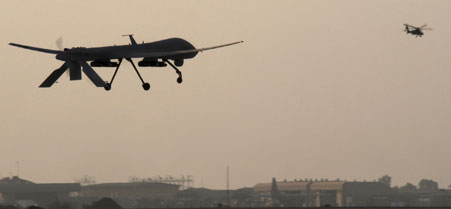Domestic drone programs spark civil-liberties lawsuit
 United States Air Force
United States Air Force
Remote-controlled aircraft have become a staple of the war in Afghanistan, but a civil-liberties group wants to know exactly who's using drones in the United States.
In a lawsuit filed on Tuesday in the U.S. District Court for the Northern District of California, the Electronic Frontier Foundation argues that federal agencies have been slow to publicize the expanding use of drones to watch Americans.
"The use of drones in American airspace could dramatically increase the physical tracking of citizens - tracking that can reveal deeply personal details about our private lives," EFF staff attorney Jennifer Lynch said in a statement.
The lawsuit against the Transportation Department and its Federal Aviation Administration comes after Freedom of Information requests failed to provide the requested information, EFF said in its complaint.
The FAA restricts recreational unpiloted aircraft, such as remote-controlled airplanes, to below 400 feet. For more high-performance aircraft, like those used by law enforcement, the FAA requires a special permit.
According to the FAA, as of last year about 50 companies, universities, and government agencies were developing and producing roughly 155 different kinds of unpiloted aircraft.
The Homeland Security Department uses at least nine drones to patrol the U.S. border, but EFF says state and local law enforcement now often use them routinely.
"Drones give the government and other unmanned aircraft operators a powerful new surveillance tool to gather extensive and intrusive data on Americans' movements and activities," Lynch said.
According to the Los Angeles Times , the FAA plans to propose new rules governing unpiloted aircraft as soon as this month.
The 50 members of the Congressional Unmanned Systems Caucus have successfully pushed DHS to use more of the drones along the Southern border.
"This is an exciting and existing technology that will continue to grow, and improve our lives as public acceptance progresses," Rep. Buck McKeon, R-Calif., who cochairs the caucus, said in a statement.





